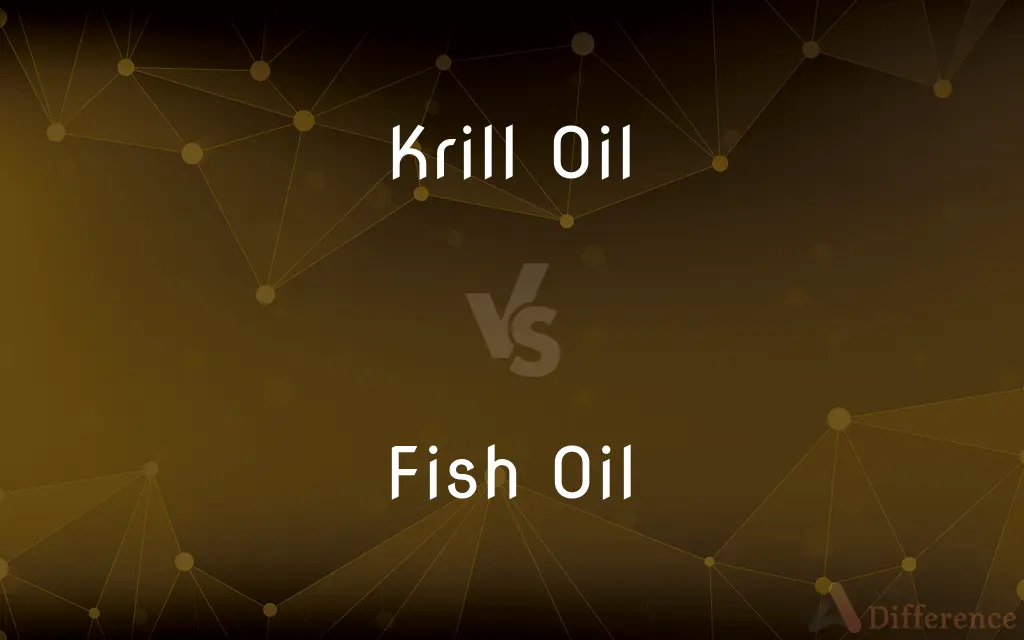Krill Oil vs. Fish Oil — What's the Difference?
By Urooj Arif & Maham Liaqat — Published on November 2, 2024
Krill oil is sourced from Antarctic krill and is rich in phospholipid-bound omega-3s, while fish oil comes from various fish and contains triglyceride-bound omega-3s.

Difference Between Krill Oil and Fish Oil
Table of Contents
ADVERTISEMENT
Key Differences
Krill oil is derived from small crustaceans called Antarctic krill, which are a key part of the marine food chain. It is notable for containing omega-3 fatty acids (EPA and DHA) bound to phospholipids, which are believed to enhance the absorption of these fatty acids in the body. On the other hand, fish oil is obtained from the tissue of oily fish such as salmon, mackerel, and sardines, with omega-3s in the form of triglycerides.
Krill oil's phospholipid-bound omega-3s are considered more easily absorbed by the body compared to the triglyceride-bound omega-3s found in fish oil. This could potentially make krill oil a more efficient source of omega-3, requiring a lower dosage to achieve similar benefits. However, fish oil has been studied more extensively over the years and is a well-established supplement for supporting heart health, reducing triglycerides, and improving overall cardiovascular functions.
Environmental sustainability is another point of difference. Krill harvesting is closely regulated to ensure it does not negatively impact the Antarctic ecosystem, and krill oil is often marketed as a more sustainable option. However, the sustainability of fish oil can vary significantly depending on the source, with some fisheries practicing more sustainable methods than others.
In terms of cost, krill oil is generally more expensive than fish oil, reflecting its lower supply and the more complex extraction process. Consumers may choose between the two based on factors such as price, environmental concerns, and perceived efficacy.
While both krill and fish oils are effective in increasing omega-3 levels in the body, they also have distinct tastes and smells. Krill oil is often considered to have a less fishy taste and odor compared to fish oil, which may be a deciding factor for some individuals.
ADVERTISEMENT
Comparison Chart
Source
Antarctic krill
Various oily fish
Omega-3 Form
Phospholipid-bound
Triglyceride-bound
Additional Components
Contains astaxanthin
May contain vitamins A and D
Bioavailability
Potentially higher due to phospholipid form
Lower compared to phospholipid-bound omega-3s
Environmental Impact
Considered more sustainable, with regulated harvesting
Sustainability varies; dependent on fishing practices
Cost
Generally more expensive
Generally less expensive
Research and Use
Less extensively studied, but gaining popularity
Well-established in scientific research
Taste and Smell
Less fishy
Fishier taste and smell
Compare with Definitions
Krill Oil
Considered a more sustainable option for omega-3 supplementation.
Sustainable harvesting practices make krill oil an environmentally friendly choice.
Fish Oil
Extensively researched for its health benefits.
Decades of research support fish oil's role in reducing triglycerides and improving heart health.
Krill Oil
Generally more expensive than fish oil due to its extraction process.
The cost of krill oil reflects its premium sourcing and manufacturing.
Fish Oil
A widely used supplement sourced from the tissue of oily fish.
Fish oil is a traditional source of omega-3 fatty acids for heart health.
Krill Oil
A supplement derived from Antarctic krill, rich in omega-3 fatty acids.
Krill oil is gaining popularity as a source of EPA and DHA bound to phospholipids.
Fish Oil
Offers a cost-effective way to supplement omega-3s.
Fish oil provides an affordable option for those looking to increase their omega-3 intake.
Krill Oil
Promoted for its potential enhanced bioavailability and absorption.
Krill oil's phospholipid-bound omega-3s are thought to be more easily utilized by the body.
Fish Oil
Contains omega-3 fatty acids in the form of triglycerides.
The triglyceride form of omega-3s in fish oil is beneficial for cardiovascular health.
Krill Oil
Contains the antioxidant astaxanthin, contributing to its red color.
The presence of astaxanthin in krill oil offers additional antioxidant benefits.
Fish Oil
Sustainability varies based on fishing practices and source.
Choosing fish oil from sustainably managed fisheries is important for environmental health.
Common Curiosities
Is fish oil effective in improving mental health?
Fish oil has been studied for its potential effects on mental health, including depression and cognitive decline. Its omega-3 content may contribute to improved brain function and mood stabilization.
How does the antioxidant astaxanthin in krill oil benefit health?
Astaxanthin, found in krill oil, is a powerful antioxidant that can help protect cells from oxidative damage, support skin health, and possibly reduce the risk of certain chronic diseases.
How do krill oil and fish oil affect cholesterol levels?
Both krill oil and fish oil can have positive effects on cholesterol levels by increasing HDL ("good") cholesterol and reducing triglycerides, though individual results may vary.
Are there any environmental concerns associated with krill oil extraction?
While krill oil extraction is regulated to prevent overfishing, there are concerns about its impact on the Antarctic ecosystem and the species that rely on krill as a primary food source.
What are EPA and DHA, and why are they important?
EPA (eicosapentaenoic acid) and DHA (docosahexaenoic acid) are types of omega-3 fatty acids important for heart health, brain function, and reducing inflammation. Krill oil and fish oil both provide these essential nutrients, though their molecular forms differ.
Can krill oil improve joint health?
Yes, krill oil is believed to improve joint health by reducing inflammation and joint pain, making it a beneficial supplement for individuals with joint-related issues.
Can krill oil help with weight management?
Some studies suggest that krill oil may assist in weight management by improving lipid metabolism and reducing fat accumulation in the body, though more research is needed.
How long does it take to see the benefits of taking krill oil or fish oil?
The time frame to see benefits from taking krill or fish oil can vary, but many individuals report noticeable improvements in symptoms like joint pain or mental clarity within a few weeks to months of consistent use.
Do krill oil and fish oil have any side effects?
Both supplements are generally well-tolerated, but some people may experience mild side effects such as fishy aftertaste, gastrointestinal discomfort, or nausea. High doses can increase the risk of bleeding.
What is the recommended dosage for krill oil and fish oil?
The recommended dosage can vary based on the concentration of EPA and DHA, individual health goals, and advice from a healthcare provider. It's important to follow the product's recommended dosage or a doctor's guidance.
How can consumers choose high-quality krill oil and fish oil supplements?
Look for supplements that provide detailed information about the source, extraction method, and amount of EPA and DHA. Third-party testing for purity and freshness is also a good indicator of quality.
Can pregnant women take krill oil or fish oil?
Omega-3 fatty acids are important for fetal development, especially DHA. Pregnant women can take krill or fish oil supplements, but it's essential to consult a healthcare provider for the appropriate dosage and product.
Can krill oil and fish oil supplements go bad?
Yes, both krill oil and fish oil supplements can go bad over time, especially if not stored properly. It's important to store them in a cool, dark place and check the expiration date before use.
Are there any vegetarian alternatives to krill oil and fish oil for omega-3s?
Yes, vegetarians can opt for algae-based omega-3 supplements, which provide DHA and EPA without the need for fish or krill oil, making them a sustainable and vegetarian-friendly option.
Share Your Discovery

Previous Comparison
Prokaryotic Protein Synthesis vs. Eukaryotic Protein Synthesis
Next Comparison
Microsoft Excel vs. Google SheetsAuthor Spotlight
Written by
Urooj ArifUrooj is a skilled content writer at Ask Difference, known for her exceptional ability to simplify complex topics into engaging and informative content. With a passion for research and a flair for clear, concise writing, she consistently delivers articles that resonate with our diverse audience.
Co-written by
Maham Liaqat












































